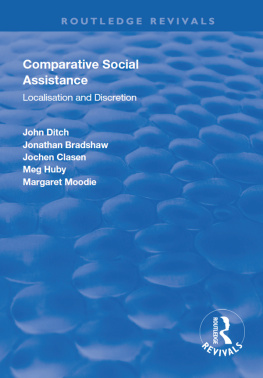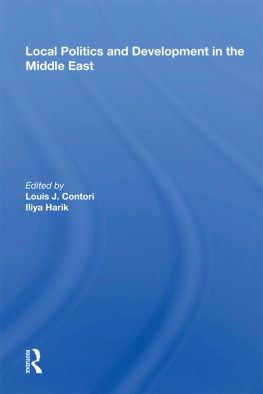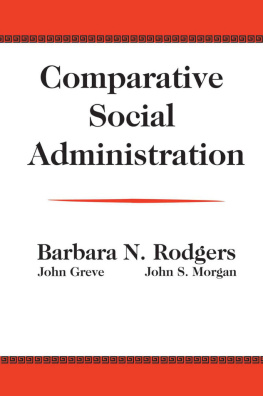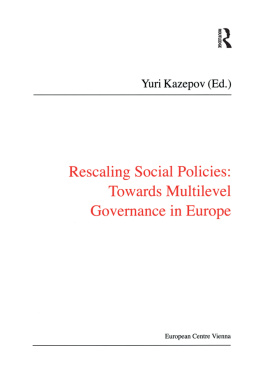COMPARATIVE SOCIAL ASSISTANCE
Studies in Cash and Care
Editors: Sally Baldwin and Jonathan Bradshaw
Cash benefits and care services together make a fundamental contribution to human welfare. After income derived from work, they are arguably the most important determinants of living standards. Indeed, many households are almost entirely dependent on benefits and services which are socially provided. Moreover, welfare benefits and services consume the lions share of public expenditure. The operation, impact and interaction of benefits and services is thus an important focus of research on social policy.
Policy related work in this field tends to be disseminated to small specialist audiences in the form of mimeographed research reports or working papers and perhaps later published, more briefly, in journal articles. In consequence public debate about vital social issues is sadly ill-informed. This series is designed to fill this gap by making the details of important empirically-based research more widely available.
Comparative Social Assistance
Localisation and Discretion
JOHN DITCH
JONATHAN BRADSHAW
JOCHEN CLASEN
MEG HUBY
MARGARET MOODIE
First published 1997 by Ashgate Publishing
Reissued 2018 by Routledge
2 Park Square, Milton Park, Abingdon, Oxon OX14 4RN
711 Third Avenue, New York, NY 10017, USA
Routledge is an imprint of the Taylor & Francis Group, an informa business
Copyright Crown Copyright 1997
All rights reserved. No part of this book may be reprinted or reproduced or utilised in any form or by any electronic, mechanical, or other means, now known or hereafter invented, including photocopying and recording, or in any information storage or retrieval system, without permission in writing from the publishers.
Notice:
Product or corporate names may be trademarks or registered trademarks, and are used only for identification and explanation without intent to infringe.
Publishers Note
The publisher has gone to great lengths to ensure the quality of this reprint but points out that some imperfections in the original copies may be apparent.
Disclaimer
The publisher has made every effort to trace copyright holders and welcomes correspondence from those they have been unable to contact.
A Library of Congress record exists under LC control number : 97077553
ISBN 13: 978-1-138-61641-7 (hbk)
ISBN 13: 978-0-429-46209-2 (ebk)
Contents
A study of this kind, conducted in such a short time frame, can only come close to success due to the goodwill of colleagues and informants in four countries. The following people have all contributed to the study and we are grateful to them.
In Germany, Berthold Dietz of Mnster; Dr Helmut Hartmann, State Social Office, Hamburg; Mr Wolf D. Klatt, Social Welfare Office, Bremen; Dr Lutz Leisering, Bremen University; Dr Johannes Steffen, Arbeiterkammer Bremen; Dr Manfred Wienand, Dr Imlau-Staupendahl and Mr Hft-Dzemski, German Association for Public and Private Welfare, Frankfurt.
In the Netherlands, Mr Crouwell, VNG; Ed Theunen, Sociale Dienst; Jan Voss, KPMG Management Consulting, The Hague; Dr Wim Van Oorschot, Tilburg University; Sylvia Korevaar, LVO (National Organisation for Change); Tanja Merkolbach, Ministerie van Sociale Zaken en Werkgelgenheid.
In Sweden, Eva Bergstrom, Professor Karin Tengvald, Pira Milton of the National Board of Health and Welfare, and Johanes Wiklund, of the Stockholm County Administrative Board. Marten Lagergren of the Ministry of Health and Social Affairs and Magdalena Brasch from the Ministry of Finance. Leif Klingensjo of the Swedish Association of Local Authorities. Harriet Westerlund, Christina Enoksson and Zara Ghaffari from Solna. Tommy Lundberg, Pia Gunnarson and Joanna Tiderman from Strangnas. Joachim Palme of the Swedish Institute for Social Research and a Special Advisor to the Minister of Social Affairs and Ake Bergmark in the Department of Social Work at the University of Stockholm.
In Switzerland, Professor F. Hepflinger (University of Zrich), M.G. Piotet (Dept. of Health and Social Affairs, Canton of Vand), M.K. Ferroni (Swiss Conference of Institutions for Social Assistance, and Canton of Graubnden), M.E. Zrcher (Sec. General of Conference of the Cantons Heads for Social Affairs), M.H. Maurer (Canton of Geneva), M.K. Jaggi (Canton of Berne), M.M. Hohn (City of Berne) and M.W. Schmid (City of Zrich), M.C. Malherbe, Federal Office for Social Insurance.
Dr Helen Bolderson and Dr Deborah Mabbett, Brunei University provided information on their research into the delivery of benefits. Emma Carmel of the University of York undertook a review of literature on the dynamics of centre-local relations. We are also grateful to Owen Thorpe, Helen Gadd, Kay Pattison and Julia Chilvers of the DSS for most helpful comments on earlier drafts of this report.
This report is based on research commissioned by the Department of Social Security (United Kingdom). Responsibility for the report, its contents and conclusions, rests with the authors alone.
We are grateful to Rebecca Harrison of the Department of Social Policy and Social Work at the University of York for typesetting the manuscript.
The Department of Social Security received the final reports from a major study of Social Assistance arrangements in the 24 OECD countries in October 1995 (Eardley et al, 1996). Although this research was comprehensive a number of important questions remained to be investigated in more detail. Specifically there is interest in the policy context, organisational structures and procedures, strengths and weaknesses of Social Assistance systems in those countries where a degree of sub-national variation exists in respect of policy, financing, administration or application of discretion. A further study was commissioned (November 1995) to examine the strengths and weaknesses of these arrangements in four European countries: Germany, the Netherlands, Sweden and Switzerland. This is the report of that review.
The objectives for the study were agreed as being to:
Assess, according to agreed criteria, how local control of Social Assistance schemes works in practice.
Examine the relationship between central, regional and local authorities in the financing and administration of Social Assistance.
Identify financial and political pressure points and emerging policy options.
These objectives were subsequently elaborated, following discussion between the research team and policy customers, to specify a list of criteria around which more detailed questions have been formulated. The criteria and questions (presented in full in ) related to the following dimensions: the contexts within which Social Assistance developed and is required to function; the structure of centre-local relations: financial responsibility; the sensitivity of Social Assistance to the circumstances of recipients and the dynamics of local economies; the extent of peer pressure and the control of fraud; the strengths and weaknesses of Social Assistance schemes and policy options for change.
Methods
The following methods have been used to address these questions:
Re-examination of data submitted by officials and experts as part of the previous study of Social Assistance (Eardley et al, 1996).






